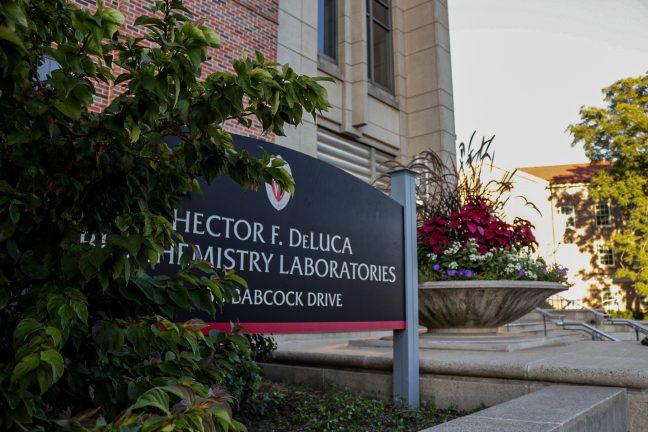University of Wisconsin biochemistry professor James Ntambi and former associate director of UW’s College of Agriculture and Life Sciences international program John Ferrick have been working to combat roadblocks for up-and-coming scientists in developing countries by leading UW’s community health initiative in Uganda.
Ntambi is dedicated to addressing the “brain drain” phenomenon in Africa and socioeconomically disadvantaged communities. Brain drain is the movement of qualified scientists out of their home countries or developing countries to areas with more resources to further their training, Ntambi said.
“Brain drain has been happening for several years and it impedes the development of developing countries,” Ntambi said.
Ntambi helped launch the Uganda Program and Village Health Project with UW faculty and students to address this phenomenon. Through these initiatives, students and researchers are extending their support to provide vital resources to developing countries, while also offering invaluable experience to the UW community.
Initially, Village Health Project operated as a Registered Student Organization with students engaging in fundraising for the project and participating hands-on in Uganda, but the COVID-19 pandemic has halted the organization. Next year, the goal is to revive the Village Health Project as a student organization at UW, Ferrick said.
In collaboration with institutions in the U.S. and Uganda, Ntambi is also working to set up basic science and nutritional biochemistry programs at the Ph.D. level in East and Central Africa, Ntambi said.
These programs allow scientists to minimize their time away from their home countries and complete a Ph.D. from a U.S. institution, through a program based in Uganda. The hope is this will encourage scientists to stay in Uganda and contribute to the development of their home communities, Ntambi said.
Ferrick intially became interested in expanding Ntambi’s work to study abroad students so they could learn about community health and research in a real-world setting. This collaboration became what’s known as the Village Health Project, Ntambi said.
In 2002, Ferrick and Ntambi initiated trips to Uganda with the aim of facilitating student exploration of global health practices and introducing them to new environments. Over time, it became clear the communities served in Uganda imparted more knowledge onto the students and faculty than they were able to offer the Ugandans, Ferrick said.
Yearly until the COVID-19 pandemic, the Village Health Project would facilitate service learning projects in Uganda, and students returning to campus formed a student organization at UW, Ferrick said. The students at UW would address issues like clean water accessibility while in the U.S. and would launch fundraising projects for their Ugandan peers abroad, Ferrick said.
“The aim is to get the students thinking — ‘here is the issue, this is what’s happening now and what are you going to do about it?'” Ferrick said. “Especially for CALS students who aspire to be healthcare providers, what are you going to do with this information?”
Students attested to the transformative nature of the experience, as they not only learned from the locals in Uganda but also shared invaluable insights with the local students, Ferrick said.
The greatest accomplishment of the Village Health Project is giving the students at UW the opportunity to gain new perspectives and envision their career in a different light, Ferrick said. Giving students greater awareness of the world outside the U.S. prompts questions about where the U.S. is putting money to help others and how it is affecting people.
Another one of the researchers’ initiatives addresses the issue of brain drain by focusing on “silent killers” such as diabetes, hypertension and obesity. What makes these “silent” is their asymptomatic nature, Ntambi said.
UW student and Village Health Project member Jacqueline Miller spent her first year in the program working in mobile clinics to help communities without access to healthcare. This work included taking vitals, offering blood sugar screenings and providing care packages.
“I have been really involved since freshman year, and I have worked in Dr. Ntambi’s lab since junior year,” Miller said.
Many people in Uganda eat food high in carbohydrates like rice, cassava and matooke, which are considered staple crops in the region, Miller said. People in economically challenged communities rely on them, but this high-carb diet contributes to diseases like diabetes, hypertension and many others, Miller said.
In Uganda, Ntambi’s research has implemented a program to develop simple devices to screen individuals for these conditions. Guidance for managing these conditions with pre-screening efforts was provided by engaging with local communities in Uganda. The goal is to empower individuals with the knowledge and tools they need to take control of their health and prevent the progression of these diseases, Ntambi said.
Miller said one way students are assisting these communities is the Soybean Sac Garden Project to develop soy bean sac gardens and informational pamphlets to send to Lweza-Mukono communities where Ntambi grew up.
The students chose soy beans because of their high protein content, richness in amino acids and regenerative and sustainable properties. Families can replant and spread the information distributed by the project through generations, Miller said.
By exposing the lack of access to research some Ugandan communities experience, Ntambi hopes to bridge this gap through educational interventions to improve health outcomes.
To ensure these programs are affordable for all students through scholarships, the Village Health Project encourages students to reach out to join and explore the many financial support options for students interested in these projects, Ferrick said.
“As a student, it’s not just about your career or getting a job — it’s about learning how you interact with people and the system,” Ferrick said. “Being a fully engaged human being [is] what education should be about, not just a career box but who you are as a person or citizen.”


